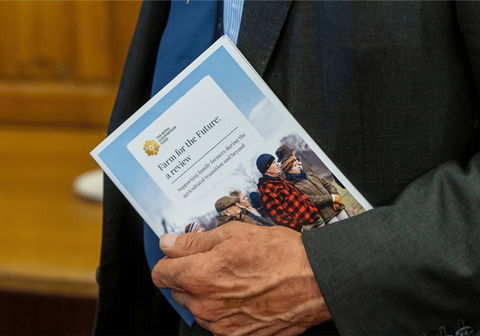Free scheme helped nearly 2,000 farmers in England

The Royal Countryside Fund (RCF) has held an event at the House of Lords to bring together farm support groups, corporate partners, rural organisations and policymakers.
The event, which was attended by Defra food security minister Daniel Zeichner, celebrated the success of the past three years of the RCF’s Farm for the Future, which was a free-to-access programme that reached 1,987 farmers in England.
It was funded by Defra’s Farming Resilience Fund and assisted family farms to adjust to the post-Brexit transformation in government support. The RCF was the only charity among the 17 providers to farmers under the scheme.
On the evening, a new publication was launched evaluating the programme’s impact. Some of the key successes included 89 per cent of participating farmers having an increased awareness of the new environmental land management schemes, while 87 per cent felt better connected to their peers.
Some 85 per cent demonstrated improved business planning skills, and there was a 97 per cent overall satisfaction rate.
Keith Halstead, executive director of The Royal Countryside Fund, said: “The agricultural transition is one of the most significant changes farming has seen in a generation. Family farms are the lifeblood of the UK’s rural communities and at The Royal Countryside Fund, we recognise how important the financial and environmental sustainability of family farm businesses is for the stewardship of our rural landscape.
“Our Farm for the Future programme proved that trusted, local support makes all the difference. We are proud of what we have achieved in partnership with local organisations and farm support groups and, most importantly, the farmers who put their trust in us.”
Zeichner added: “The Royal Countryside Fund’s work to provide help, support and advice to farmers is truly remarkable. We are moving to a different form of farming which absolutely prioritises food production, but at the same time enables people to work with nature and in a more environmentally sustainable way.
“The Royal Countryside Fund has been a key part of that effort as people make the transition and we go towards a very exciting new world.”
One of the major strengths of the programme was the role of its 14 delivery partners, who reached farmers in 44 counties across England. These partners, which included farm support groups, national park authorities, rural colleges and organisations, and a virtual coordinator, played a vital role in engaging farming communities and providing tailored support, according to the organisers.
Their on-the-ground networks, local credibility and deep understanding of regional farming needs enabled the programme to reach farmers who might otherwise have been left behind, they added. Farmers also had the option to join a virtual group so that they could receive the benefits of the programme even if they were too busy to leave the farm or were too far from an in-person workshop.



